Research Project on NHS Efficiency
VerifiedAdded on 2020/07/22
|9
|2347
|95
Project
AI Summary
This project focuses on identifying effective management strategies to enhance the efficiency of the National Health Services (NHS). It includes a detailed analysis of current practices, research questions, literature review, proposed methods, project plan, and potential implications of the findings. The study aims to provide actionable recommendations for improving NHS operations and overall healthcare delivery.

NEW ADVANCES IN
BUSINESS
BUSINESS
Paraphrase This Document
Need a fresh take? Get an instant paraphrase of this document with our AI Paraphraser
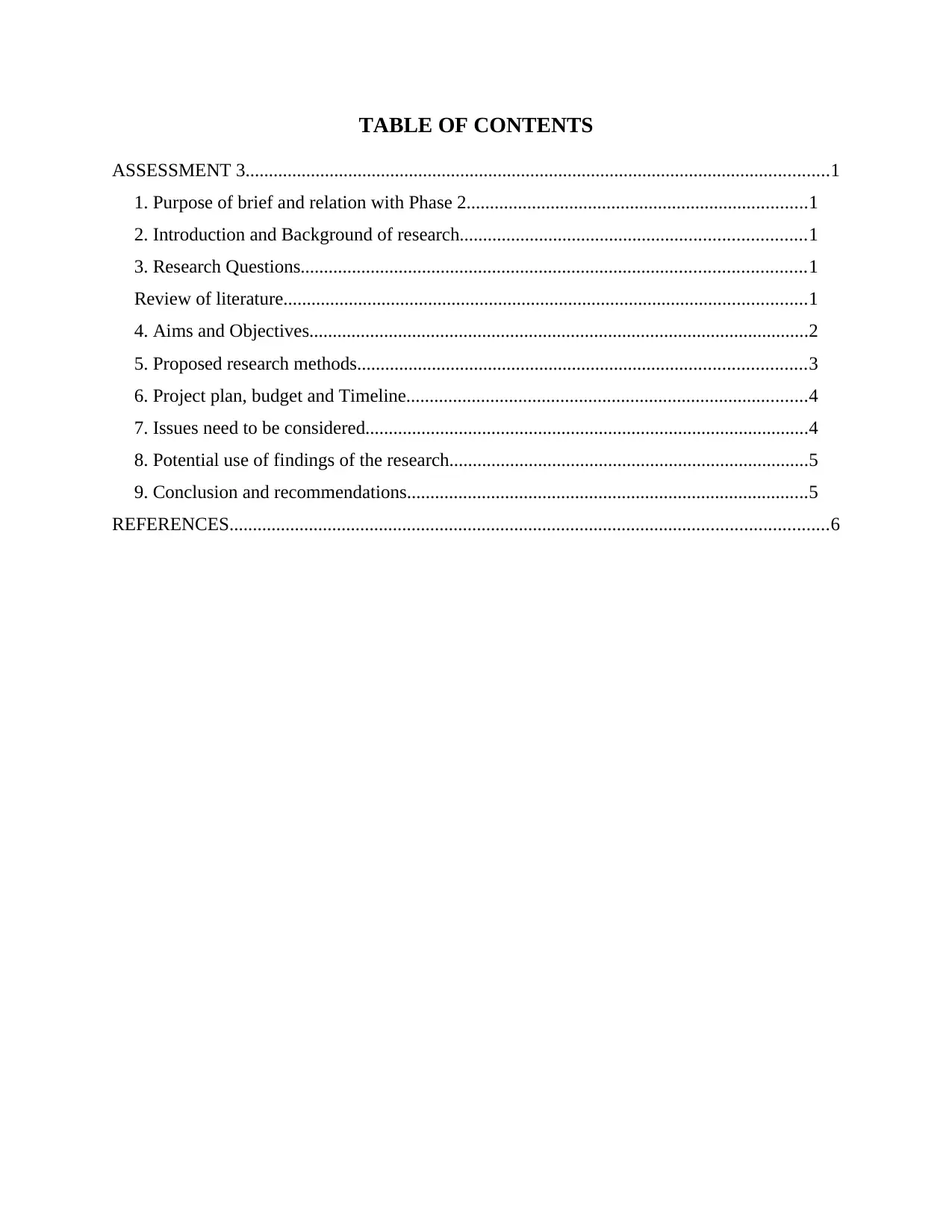
TABLE OF CONTENTS
ASSESSMENT 3.............................................................................................................................1
1. Purpose of brief and relation with Phase 2.........................................................................1
2. Introduction and Background of research..........................................................................1
3. Research Questions............................................................................................................1
Review of literature................................................................................................................1
4. Aims and Objectives...........................................................................................................2
5. Proposed research methods................................................................................................3
6. Project plan, budget and Timeline......................................................................................4
7. Issues need to be considered...............................................................................................4
8. Potential use of findings of the research.............................................................................5
9. Conclusion and recommendations......................................................................................5
REFERENCES................................................................................................................................6
ASSESSMENT 3.............................................................................................................................1
1. Purpose of brief and relation with Phase 2.........................................................................1
2. Introduction and Background of research..........................................................................1
3. Research Questions............................................................................................................1
Review of literature................................................................................................................1
4. Aims and Objectives...........................................................................................................2
5. Proposed research methods................................................................................................3
6. Project plan, budget and Timeline......................................................................................4
7. Issues need to be considered...............................................................................................4
8. Potential use of findings of the research.............................................................................5
9. Conclusion and recommendations......................................................................................5
REFERENCES................................................................................................................................6
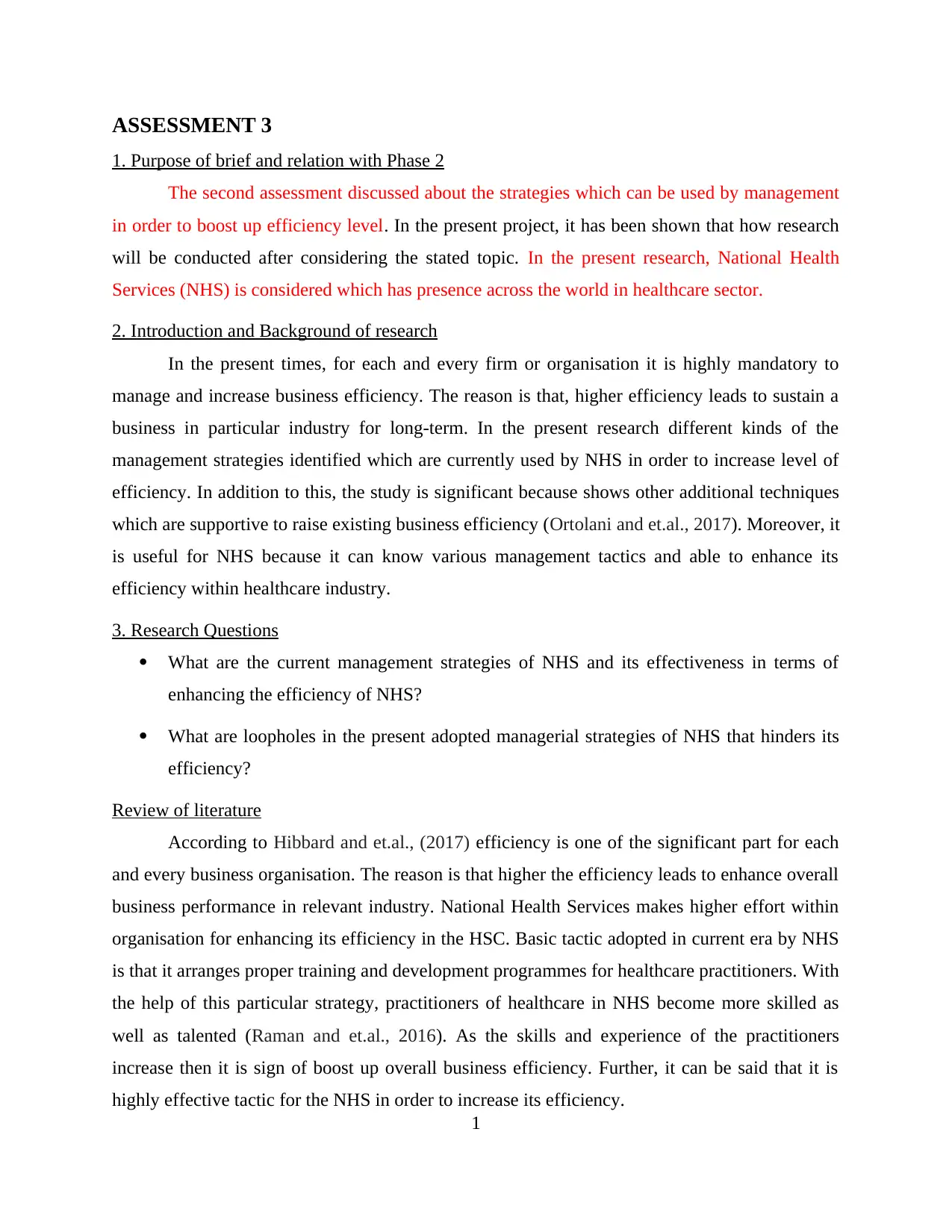
ASSESSMENT 3
1. Purpose of brief and relation with Phase 2
The second assessment discussed about the strategies which can be used by management
in order to boost up efficiency level. In the present project, it has been shown that how research
will be conducted after considering the stated topic. In the present research, National Health
Services (NHS) is considered which has presence across the world in healthcare sector.
2. Introduction and Background of research
In the present times, for each and every firm or organisation it is highly mandatory to
manage and increase business efficiency. The reason is that, higher efficiency leads to sustain a
business in particular industry for long-term. In the present research different kinds of the
management strategies identified which are currently used by NHS in order to increase level of
efficiency. In addition to this, the study is significant because shows other additional techniques
which are supportive to raise existing business efficiency (Ortolani and et.al., 2017). Moreover, it
is useful for NHS because it can know various management tactics and able to enhance its
efficiency within healthcare industry.
3. Research Questions
What are the current management strategies of NHS and its effectiveness in terms of
enhancing the efficiency of NHS?
What are loopholes in the present adopted managerial strategies of NHS that hinders its
efficiency?
Review of literature
According to Hibbard and et.al., (2017) efficiency is one of the significant part for each
and every business organisation. The reason is that higher the efficiency leads to enhance overall
business performance in relevant industry. National Health Services makes higher effort within
organisation for enhancing its efficiency in the HSC. Basic tactic adopted in current era by NHS
is that it arranges proper training and development programmes for healthcare practitioners. With
the help of this particular strategy, practitioners of healthcare in NHS become more skilled as
well as talented (Raman and et.al., 2016). As the skills and experience of the practitioners
increase then it is sign of boost up overall business efficiency. Further, it can be said that it is
highly effective tactic for the NHS in order to increase its efficiency.
1
1. Purpose of brief and relation with Phase 2
The second assessment discussed about the strategies which can be used by management
in order to boost up efficiency level. In the present project, it has been shown that how research
will be conducted after considering the stated topic. In the present research, National Health
Services (NHS) is considered which has presence across the world in healthcare sector.
2. Introduction and Background of research
In the present times, for each and every firm or organisation it is highly mandatory to
manage and increase business efficiency. The reason is that, higher efficiency leads to sustain a
business in particular industry for long-term. In the present research different kinds of the
management strategies identified which are currently used by NHS in order to increase level of
efficiency. In addition to this, the study is significant because shows other additional techniques
which are supportive to raise existing business efficiency (Ortolani and et.al., 2017). Moreover, it
is useful for NHS because it can know various management tactics and able to enhance its
efficiency within healthcare industry.
3. Research Questions
What are the current management strategies of NHS and its effectiveness in terms of
enhancing the efficiency of NHS?
What are loopholes in the present adopted managerial strategies of NHS that hinders its
efficiency?
Review of literature
According to Hibbard and et.al., (2017) efficiency is one of the significant part for each
and every business organisation. The reason is that higher the efficiency leads to enhance overall
business performance in relevant industry. National Health Services makes higher effort within
organisation for enhancing its efficiency in the HSC. Basic tactic adopted in current era by NHS
is that it arranges proper training and development programmes for healthcare practitioners. With
the help of this particular strategy, practitioners of healthcare in NHS become more skilled as
well as talented (Raman and et.al., 2016). As the skills and experience of the practitioners
increase then it is sign of boost up overall business efficiency. Further, it can be said that it is
highly effective tactic for the NHS in order to increase its efficiency.
1
⊘ This is a preview!⊘
Do you want full access?
Subscribe today to unlock all pages.

Trusted by 1+ million students worldwide
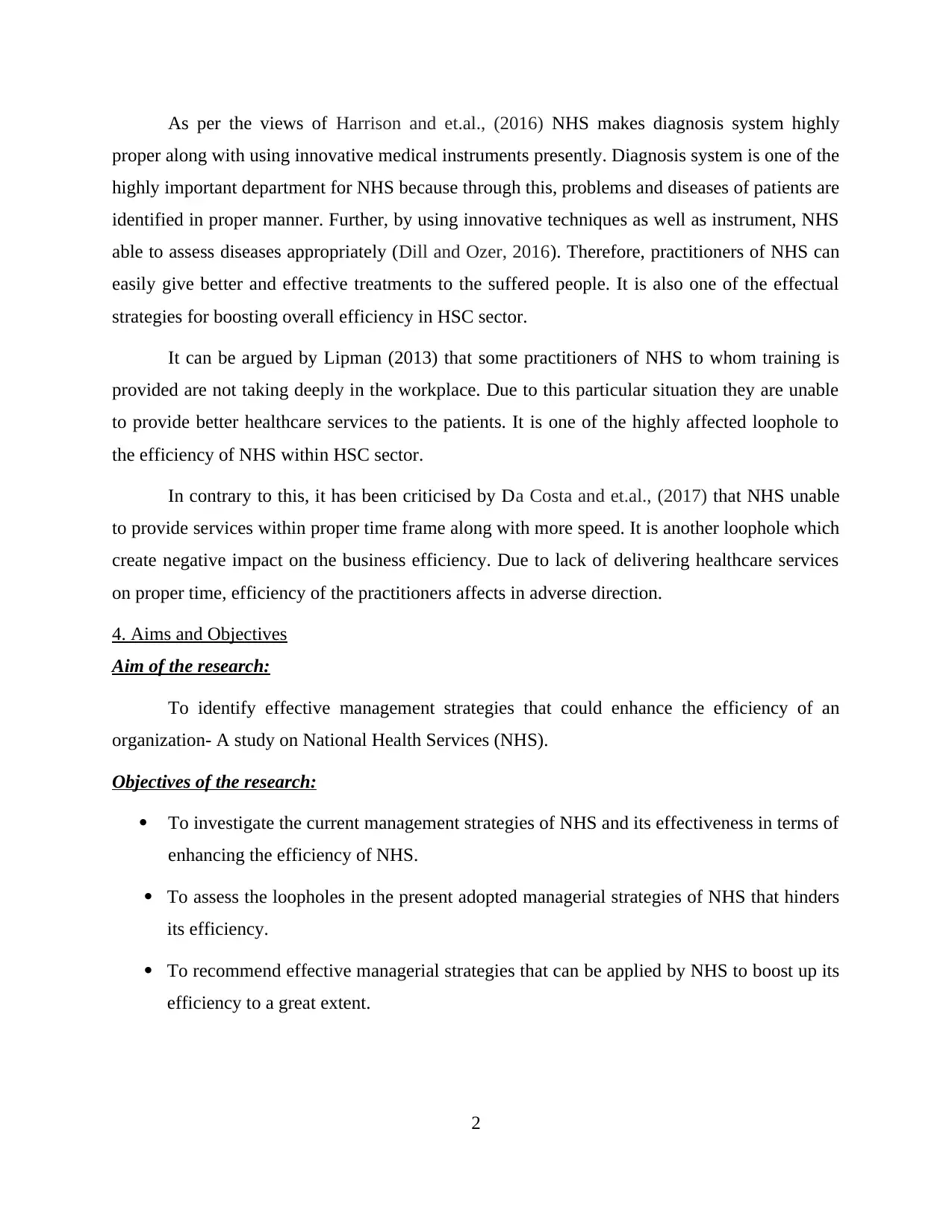
As per the views of Harrison and et.al., (2016) NHS makes diagnosis system highly
proper along with using innovative medical instruments presently. Diagnosis system is one of the
highly important department for NHS because through this, problems and diseases of patients are
identified in proper manner. Further, by using innovative techniques as well as instrument, NHS
able to assess diseases appropriately (Dill and Ozer, 2016). Therefore, practitioners of NHS can
easily give better and effective treatments to the suffered people. It is also one of the effectual
strategies for boosting overall efficiency in HSC sector.
It can be argued by Lipman (2013) that some practitioners of NHS to whom training is
provided are not taking deeply in the workplace. Due to this particular situation they are unable
to provide better healthcare services to the patients. It is one of the highly affected loophole to
the efficiency of NHS within HSC sector.
In contrary to this, it has been criticised by Da Costa and et.al., (2017) that NHS unable
to provide services within proper time frame along with more speed. It is another loophole which
create negative impact on the business efficiency. Due to lack of delivering healthcare services
on proper time, efficiency of the practitioners affects in adverse direction.
4. Aims and Objectives
Aim of the research:
To identify effective management strategies that could enhance the efficiency of an
organization- A study on National Health Services (NHS).
Objectives of the research:
To investigate the current management strategies of NHS and its effectiveness in terms of
enhancing the efficiency of NHS.
To assess the loopholes in the present adopted managerial strategies of NHS that hinders
its efficiency.
To recommend effective managerial strategies that can be applied by NHS to boost up its
efficiency to a great extent.
2
proper along with using innovative medical instruments presently. Diagnosis system is one of the
highly important department for NHS because through this, problems and diseases of patients are
identified in proper manner. Further, by using innovative techniques as well as instrument, NHS
able to assess diseases appropriately (Dill and Ozer, 2016). Therefore, practitioners of NHS can
easily give better and effective treatments to the suffered people. It is also one of the effectual
strategies for boosting overall efficiency in HSC sector.
It can be argued by Lipman (2013) that some practitioners of NHS to whom training is
provided are not taking deeply in the workplace. Due to this particular situation they are unable
to provide better healthcare services to the patients. It is one of the highly affected loophole to
the efficiency of NHS within HSC sector.
In contrary to this, it has been criticised by Da Costa and et.al., (2017) that NHS unable
to provide services within proper time frame along with more speed. It is another loophole which
create negative impact on the business efficiency. Due to lack of delivering healthcare services
on proper time, efficiency of the practitioners affects in adverse direction.
4. Aims and Objectives
Aim of the research:
To identify effective management strategies that could enhance the efficiency of an
organization- A study on National Health Services (NHS).
Objectives of the research:
To investigate the current management strategies of NHS and its effectiveness in terms of
enhancing the efficiency of NHS.
To assess the loopholes in the present adopted managerial strategies of NHS that hinders
its efficiency.
To recommend effective managerial strategies that can be applied by NHS to boost up its
efficiency to a great extent.
2
Paraphrase This Document
Need a fresh take? Get an instant paraphrase of this document with our AI Paraphraser
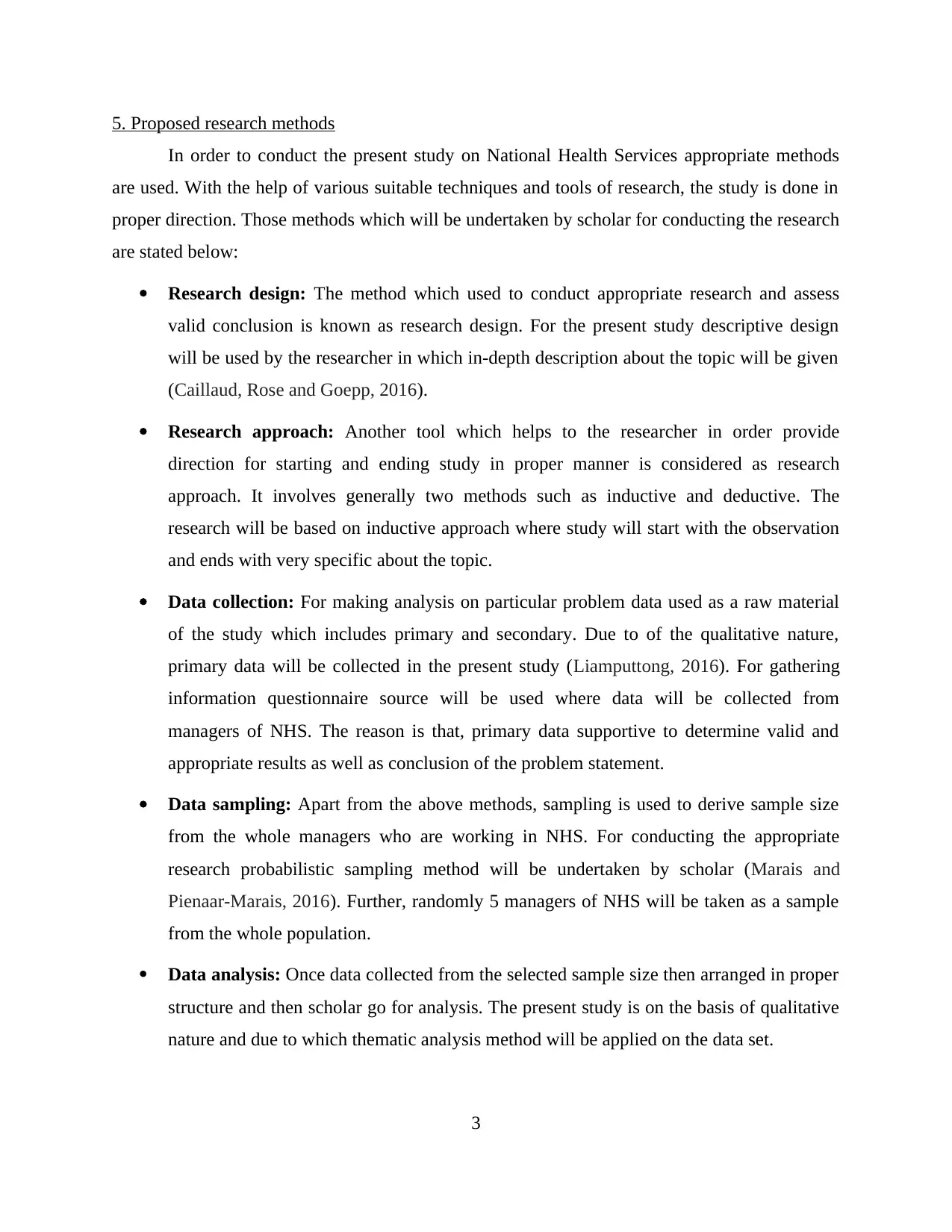
5. Proposed research methods
In order to conduct the present study on National Health Services appropriate methods
are used. With the help of various suitable techniques and tools of research, the study is done in
proper direction. Those methods which will be undertaken by scholar for conducting the research
are stated below:
Research design: The method which used to conduct appropriate research and assess
valid conclusion is known as research design. For the present study descriptive design
will be used by the researcher in which in-depth description about the topic will be given
(Caillaud, Rose and Goepp, 2016).
Research approach: Another tool which helps to the researcher in order provide
direction for starting and ending study in proper manner is considered as research
approach. It involves generally two methods such as inductive and deductive. The
research will be based on inductive approach where study will start with the observation
and ends with very specific about the topic.
Data collection: For making analysis on particular problem data used as a raw material
of the study which includes primary and secondary. Due to of the qualitative nature,
primary data will be collected in the present study (Liamputtong, 2016). For gathering
information questionnaire source will be used where data will be collected from
managers of NHS. The reason is that, primary data supportive to determine valid and
appropriate results as well as conclusion of the problem statement.
Data sampling: Apart from the above methods, sampling is used to derive sample size
from the whole managers who are working in NHS. For conducting the appropriate
research probabilistic sampling method will be undertaken by scholar (Marais and
Pienaar-Marais, 2016). Further, randomly 5 managers of NHS will be taken as a sample
from the whole population.
Data analysis: Once data collected from the selected sample size then arranged in proper
structure and then scholar go for analysis. The present study is on the basis of qualitative
nature and due to which thematic analysis method will be applied on the data set.
3
In order to conduct the present study on National Health Services appropriate methods
are used. With the help of various suitable techniques and tools of research, the study is done in
proper direction. Those methods which will be undertaken by scholar for conducting the research
are stated below:
Research design: The method which used to conduct appropriate research and assess
valid conclusion is known as research design. For the present study descriptive design
will be used by the researcher in which in-depth description about the topic will be given
(Caillaud, Rose and Goepp, 2016).
Research approach: Another tool which helps to the researcher in order provide
direction for starting and ending study in proper manner is considered as research
approach. It involves generally two methods such as inductive and deductive. The
research will be based on inductive approach where study will start with the observation
and ends with very specific about the topic.
Data collection: For making analysis on particular problem data used as a raw material
of the study which includes primary and secondary. Due to of the qualitative nature,
primary data will be collected in the present study (Liamputtong, 2016). For gathering
information questionnaire source will be used where data will be collected from
managers of NHS. The reason is that, primary data supportive to determine valid and
appropriate results as well as conclusion of the problem statement.
Data sampling: Apart from the above methods, sampling is used to derive sample size
from the whole managers who are working in NHS. For conducting the appropriate
research probabilistic sampling method will be undertaken by scholar (Marais and
Pienaar-Marais, 2016). Further, randomly 5 managers of NHS will be taken as a sample
from the whole population.
Data analysis: Once data collected from the selected sample size then arranged in proper
structure and then scholar go for analysis. The present study is on the basis of qualitative
nature and due to which thematic analysis method will be applied on the data set.
3
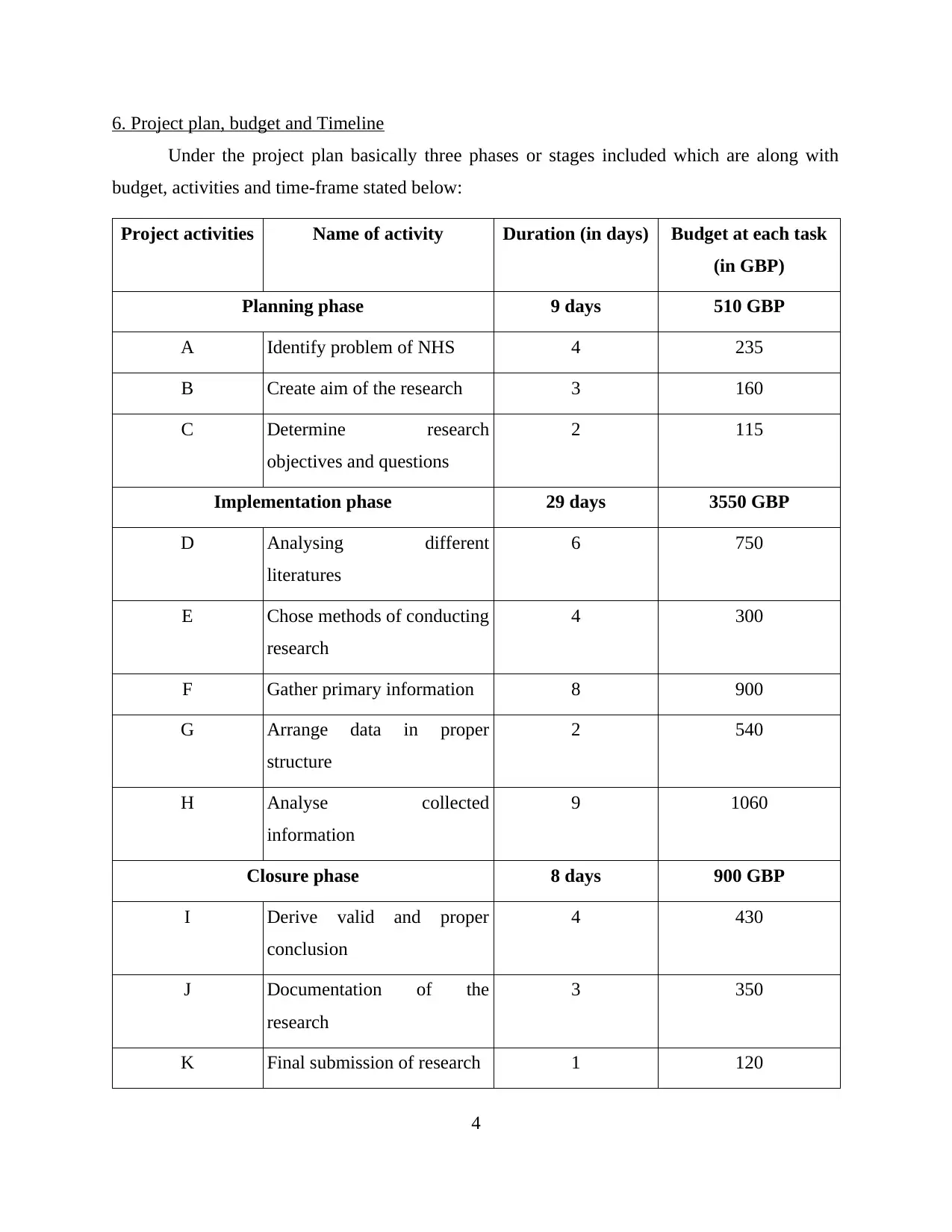
6. Project plan, budget and Timeline
Under the project plan basically three phases or stages included which are along with
budget, activities and time-frame stated below:
Project activities Name of activity Duration (in days) Budget at each task
(in GBP)
Planning phase 9 days 510 GBP
A Identify problem of NHS 4 235
B Create aim of the research 3 160
C Determine research
objectives and questions
2 115
Implementation phase 29 days 3550 GBP
D Analysing different
literatures
6 750
E Chose methods of conducting
research
4 300
F Gather primary information 8 900
G Arrange data in proper
structure
2 540
H Analyse collected
information
9 1060
Closure phase 8 days 900 GBP
I Derive valid and proper
conclusion
4 430
J Documentation of the
research
3 350
K Final submission of research 1 120
4
Under the project plan basically three phases or stages included which are along with
budget, activities and time-frame stated below:
Project activities Name of activity Duration (in days) Budget at each task
(in GBP)
Planning phase 9 days 510 GBP
A Identify problem of NHS 4 235
B Create aim of the research 3 160
C Determine research
objectives and questions
2 115
Implementation phase 29 days 3550 GBP
D Analysing different
literatures
6 750
E Chose methods of conducting
research
4 300
F Gather primary information 8 900
G Arrange data in proper
structure
2 540
H Analyse collected
information
9 1060
Closure phase 8 days 900 GBP
I Derive valid and proper
conclusion
4 430
J Documentation of the
research
3 350
K Final submission of research 1 120
4
⊘ This is a preview!⊘
Do you want full access?
Subscribe today to unlock all pages.

Trusted by 1+ million students worldwide
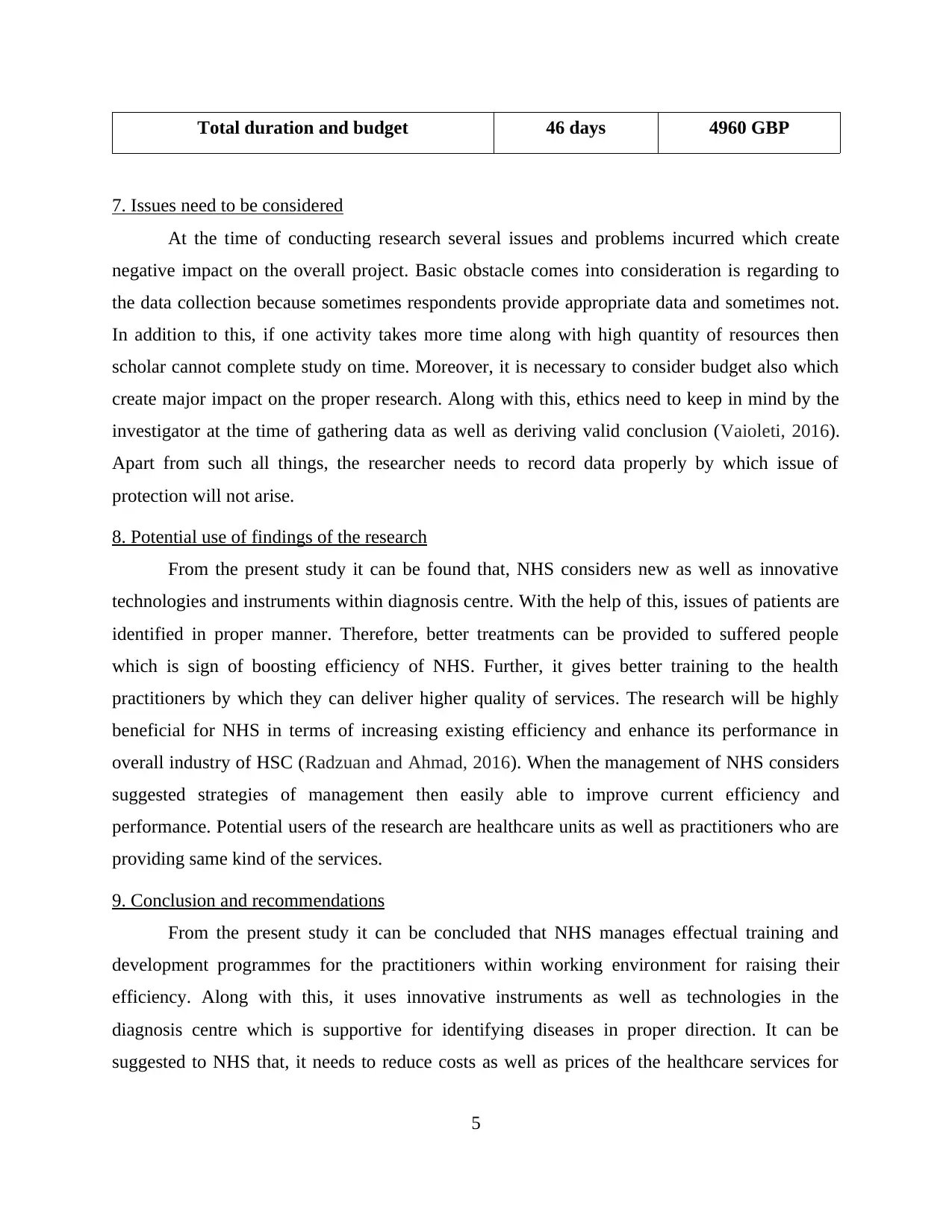
Total duration and budget 46 days 4960 GBP
7. Issues need to be considered
At the time of conducting research several issues and problems incurred which create
negative impact on the overall project. Basic obstacle comes into consideration is regarding to
the data collection because sometimes respondents provide appropriate data and sometimes not.
In addition to this, if one activity takes more time along with high quantity of resources then
scholar cannot complete study on time. Moreover, it is necessary to consider budget also which
create major impact on the proper research. Along with this, ethics need to keep in mind by the
investigator at the time of gathering data as well as deriving valid conclusion (Vaioleti, 2016).
Apart from such all things, the researcher needs to record data properly by which issue of
protection will not arise.
8. Potential use of findings of the research
From the present study it can be found that, NHS considers new as well as innovative
technologies and instruments within diagnosis centre. With the help of this, issues of patients are
identified in proper manner. Therefore, better treatments can be provided to suffered people
which is sign of boosting efficiency of NHS. Further, it gives better training to the health
practitioners by which they can deliver higher quality of services. The research will be highly
beneficial for NHS in terms of increasing existing efficiency and enhance its performance in
overall industry of HSC (Radzuan and Ahmad, 2016). When the management of NHS considers
suggested strategies of management then easily able to improve current efficiency and
performance. Potential users of the research are healthcare units as well as practitioners who are
providing same kind of the services.
9. Conclusion and recommendations
From the present study it can be concluded that NHS manages effectual training and
development programmes for the practitioners within working environment for raising their
efficiency. Along with this, it uses innovative instruments as well as technologies in the
diagnosis centre which is supportive for identifying diseases in proper direction. It can be
suggested to NHS that, it needs to reduce costs as well as prices of the healthcare services for
5
7. Issues need to be considered
At the time of conducting research several issues and problems incurred which create
negative impact on the overall project. Basic obstacle comes into consideration is regarding to
the data collection because sometimes respondents provide appropriate data and sometimes not.
In addition to this, if one activity takes more time along with high quantity of resources then
scholar cannot complete study on time. Moreover, it is necessary to consider budget also which
create major impact on the proper research. Along with this, ethics need to keep in mind by the
investigator at the time of gathering data as well as deriving valid conclusion (Vaioleti, 2016).
Apart from such all things, the researcher needs to record data properly by which issue of
protection will not arise.
8. Potential use of findings of the research
From the present study it can be found that, NHS considers new as well as innovative
technologies and instruments within diagnosis centre. With the help of this, issues of patients are
identified in proper manner. Therefore, better treatments can be provided to suffered people
which is sign of boosting efficiency of NHS. Further, it gives better training to the health
practitioners by which they can deliver higher quality of services. The research will be highly
beneficial for NHS in terms of increasing existing efficiency and enhance its performance in
overall industry of HSC (Radzuan and Ahmad, 2016). When the management of NHS considers
suggested strategies of management then easily able to improve current efficiency and
performance. Potential users of the research are healthcare units as well as practitioners who are
providing same kind of the services.
9. Conclusion and recommendations
From the present study it can be concluded that NHS manages effectual training and
development programmes for the practitioners within working environment for raising their
efficiency. Along with this, it uses innovative instruments as well as technologies in the
diagnosis centre which is supportive for identifying diseases in proper direction. It can be
suggested to NHS that, it needs to reduce costs as well as prices of the healthcare services for
5
Paraphrase This Document
Need a fresh take? Get an instant paraphrase of this document with our AI Paraphraser
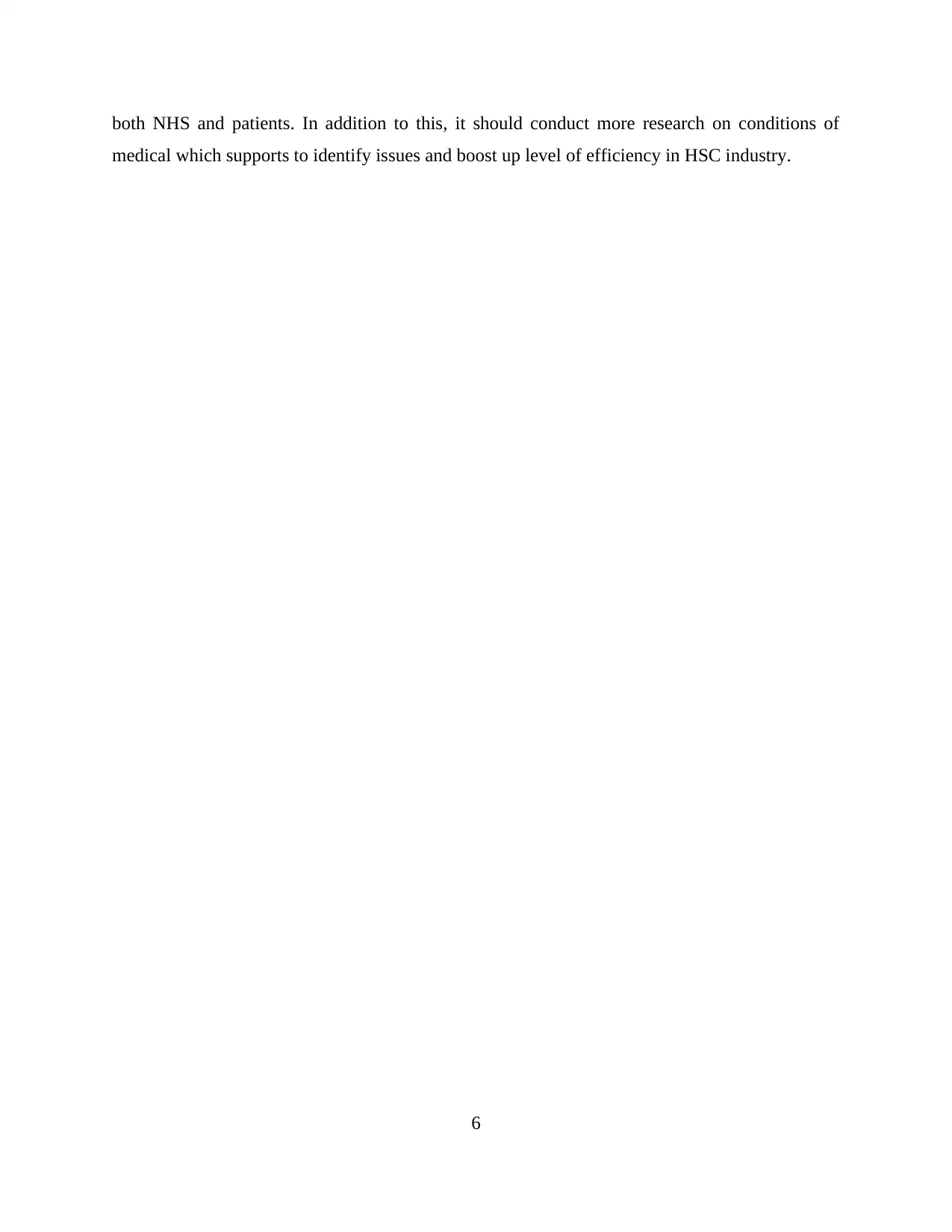
both NHS and patients. In addition to this, it should conduct more research on conditions of
medical which supports to identify issues and boost up level of efficiency in HSC industry.
6
medical which supports to identify issues and boost up level of efficiency in HSC industry.
6
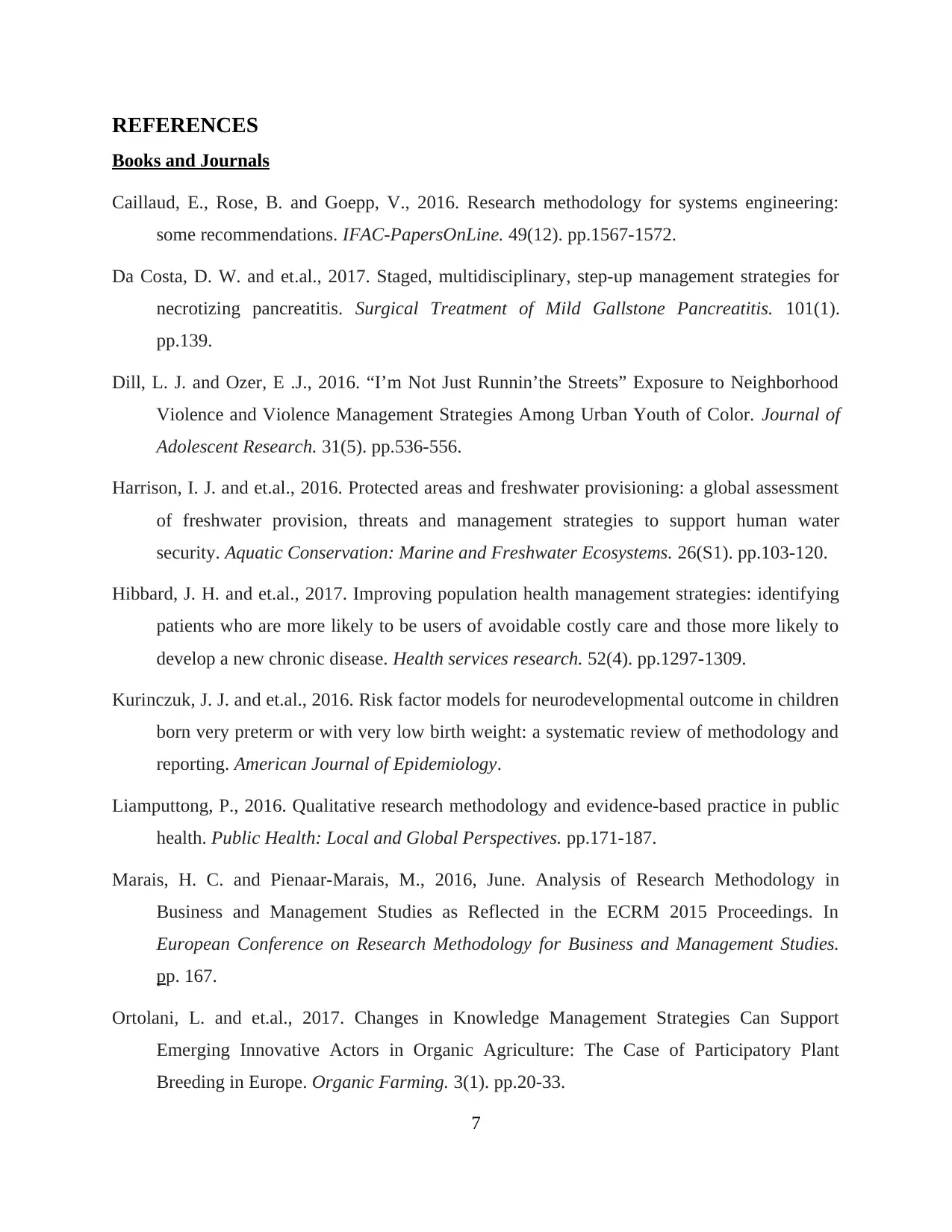
REFERENCES
Books and Journals
Caillaud, E., Rose, B. and Goepp, V., 2016. Research methodology for systems engineering:
some recommendations. IFAC-PapersOnLine. 49(12). pp.1567-1572.
Da Costa, D. W. and et.al., 2017. Staged, multidisciplinary, step-up management strategies for
necrotizing pancreatitis. Surgical Treatment of Mild Gallstone Pancreatitis. 101(1).
pp.139.
Dill, L. J. and Ozer, E .J., 2016. “I’m Not Just Runnin’the Streets” Exposure to Neighborhood
Violence and Violence Management Strategies Among Urban Youth of Color. Journal of
Adolescent Research. 31(5). pp.536-556.
Harrison, I. J. and et.al., 2016. Protected areas and freshwater provisioning: a global assessment
of freshwater provision, threats and management strategies to support human water
security. Aquatic Conservation: Marine and Freshwater Ecosystems. 26(S1). pp.103-120.
Hibbard, J. H. and et.al., 2017. Improving population health management strategies: identifying
patients who are more likely to be users of avoidable costly care and those more likely to
develop a new chronic disease. Health services research. 52(4). pp.1297-1309.
Kurinczuk, J. J. and et.al., 2016. Risk factor models for neurodevelopmental outcome in children
born very preterm or with very low birth weight: a systematic review of methodology and
reporting. American Journal of Epidemiology.
Liamputtong, P., 2016. Qualitative research methodology and evidence-based practice in public
health. Public Health: Local and Global Perspectives. pp.171-187.
Marais, H. C. and Pienaar-Marais, M., 2016, June. Analysis of Research Methodology in
Business and Management Studies as Reflected in the ECRM 2015 Proceedings. In
European Conference on Research Methodology for Business and Management Studies.
pp. 167.
Ortolani, L. and et.al., 2017. Changes in Knowledge Management Strategies Can Support
Emerging Innovative Actors in Organic Agriculture: The Case of Participatory Plant
Breeding in Europe. Organic Farming. 3(1). pp.20-33.
7
Books and Journals
Caillaud, E., Rose, B. and Goepp, V., 2016. Research methodology for systems engineering:
some recommendations. IFAC-PapersOnLine. 49(12). pp.1567-1572.
Da Costa, D. W. and et.al., 2017. Staged, multidisciplinary, step-up management strategies for
necrotizing pancreatitis. Surgical Treatment of Mild Gallstone Pancreatitis. 101(1).
pp.139.
Dill, L. J. and Ozer, E .J., 2016. “I’m Not Just Runnin’the Streets” Exposure to Neighborhood
Violence and Violence Management Strategies Among Urban Youth of Color. Journal of
Adolescent Research. 31(5). pp.536-556.
Harrison, I. J. and et.al., 2016. Protected areas and freshwater provisioning: a global assessment
of freshwater provision, threats and management strategies to support human water
security. Aquatic Conservation: Marine and Freshwater Ecosystems. 26(S1). pp.103-120.
Hibbard, J. H. and et.al., 2017. Improving population health management strategies: identifying
patients who are more likely to be users of avoidable costly care and those more likely to
develop a new chronic disease. Health services research. 52(4). pp.1297-1309.
Kurinczuk, J. J. and et.al., 2016. Risk factor models for neurodevelopmental outcome in children
born very preterm or with very low birth weight: a systematic review of methodology and
reporting. American Journal of Epidemiology.
Liamputtong, P., 2016. Qualitative research methodology and evidence-based practice in public
health. Public Health: Local and Global Perspectives. pp.171-187.
Marais, H. C. and Pienaar-Marais, M., 2016, June. Analysis of Research Methodology in
Business and Management Studies as Reflected in the ECRM 2015 Proceedings. In
European Conference on Research Methodology for Business and Management Studies.
pp. 167.
Ortolani, L. and et.al., 2017. Changes in Knowledge Management Strategies Can Support
Emerging Innovative Actors in Organic Agriculture: The Case of Participatory Plant
Breeding in Europe. Organic Farming. 3(1). pp.20-33.
7
⊘ This is a preview!⊘
Do you want full access?
Subscribe today to unlock all pages.

Trusted by 1+ million students worldwide
1 out of 9
Related Documents
Your All-in-One AI-Powered Toolkit for Academic Success.
+13062052269
info@desklib.com
Available 24*7 on WhatsApp / Email
![[object Object]](/_next/static/media/star-bottom.7253800d.svg)
Unlock your academic potential
Copyright © 2020–2025 A2Z Services. All Rights Reserved. Developed and managed by ZUCOL.





